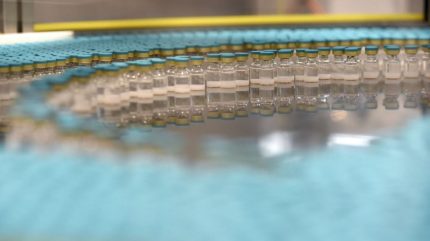

“Give a country a vaccine and they will vaccinate for a day. Teach a country how to manufacture vaccines and they will be vaccinated for a lifetime,” read a recent Tweet from Peter Singer, special advisor to the director-general of the World Health Organisation.
Singer is one of many senior figures in global health calling for ‘systemic change’ in vaccine production; more specifically, a larger and better spread of vaccine manufacturing around the world. Increased regional and national self-reliance will help fight future pandemics, he argues.

Discover B2B Marketing That Performs
Combine business intelligence and editorial excellence to reach engaged professionals across 36 leading media platforms.
An enormous imbalance does indeed exist. As showcased by the map below, the production of Covid-19 vaccines is highly concentrated in the US, Europe, China and India – where more than 90% of all doses are expected to be made. The rest of the world – especially most of Africa, Asia and Latin America – is simply not part of the picture. Africa and western Asia are particularly devoid and removed from the process, much as they are from the world’s largest foreign investors, across all sectors.
This is problematic as demand for vaccines far outstrips global production capacity. Wealthier nations have already made deals with the leading vaccine manufacturers to reserve billions of doses, meaning lower-income countries might have to wait until 2023 or 2024 before gaining widespread access. Moreover, vaccines have become geopolitical weapons, with China taking the most active role in ‘gifting’ doses to low and middle-income countries, alongside the ‘Western’ Covax initiative.
“Most countries in the world have no Covid vaccine manufacturing capacity, showing just how acutely vulnerable billions of people are to protectionist politics, conflicts, natural disasters and fresh surges of the coronavirus impacting the transit of vaccines across their borders,” says Helen Ramscar, an associate fellow of the Royal United Services Institute.

US Tariffs are shifting - will you react or anticipate?
Don’t let policy changes catch you off guard. Stay proactive with real-time data and expert analysis.
By GlobalDataWhy is production so geographically concentrated?
In the face of the global vaccine deficit, calls are growing louder to scale up manufacturing capacity in Africa and other developing regions.
Most countries in the world have no Covid vaccine manufacturing capacity, showing just how acutely vulnerable billions of people are to protectionist politics, conflicts, natural disasters and fresh surges of the coronavirus. Helen Ramscar, Royal United Services Institute
The problem, however, is that (general) vaccine manufacturing in these parts of the world is very limited. For example, African vaccine manufacturers currently produce less than 1% of the non-Covid related vaccines that are used across the continent. It is no surprise, therefore, that Africa has no Covid-19 vaccine developer.
“[As a result], developers in the US, China, India and Europe cannot tech transfer their vaccine production to the vast majority of Africa,” says an anonymous expert in global health. “In general, it is very difficult to execute a tech transfer for vaccines due to the sheer complexity of vaccine manufacturing. Even the labelling and packaging is extremely complicated.
“Vaccine manufacturing really lends itself to being a natural monopoly. It is all about scale. So if you break it up into tiny pieces, each country making vaccines for itself, the prices will inevitably be much higher than the current situation, where you have got clusters and regional hubs.”
Africa, however, lacks a regional hub of its own. South Africa and Egypt could assume that role one day, since their vaccine manufacturing industries are the most developed. It is hoped that the pandemic will galvanise the continent's vaccine capabilities. Historically speaking, “governments have shown little interest in the development of a local pharmaceutical industry, except when there was foreign investment”, said Ama Pokuaa Fenny, researcher at the University of Ghana, in an interview for Le Monde.
Covid-19 has globalised vaccine production
A striking number of vaccine developers – namely the ‘Western’ ones – are producing their product abroad, as per Investment Monitor’s map.
“Covid-19 has accelerated the globalisation of vaccine production," says the anonymous commentator. "There have been many tech transfers. No one could have imagined this happening before Covid, which helped breed more collaboration and democratise vaccine capabilities.”
As the map shows, AstraZeneca has the most global manufacturing capacity – it is currently the only developer with operations on all six continents. Meanwhile, the majority of vaccine developers have opted to run foreign facilities, or just produce in the US or western Europe.
“In the first half of 2020, AstraZeneca was doing deals around the world left, right and centre, while the other main developers kept their cards close to their chest," says the anonymous commentator. "It was very ambitious, and the company encountered lots of challenges, but it might pay off since it has more immediate access to local markets, globally.
“One reason that the Chinese may have had less success in globalising their vaccine production could be the language barrier. Remember, tech transfers are extremely difficult, even when everyone speaks English, for example.”
Another striking feature of Investment Monitor’s map is the sheer number of vaccine developers that exist.
“While only four vaccines on the map – Pfizer, AstraZeneca, Moderna, and Johnson & Johnson – are approved for use by major regulator authorities, there is an encouraging number of vaccines," says Ramscar. "Less encouraging is the number of other vaccines already being distributed prior to serious and transparent scrutiny of their safety for patients.”
China and Russia have not requested authorisation from the European Medicines Agency for their Covid vaccines. Several dozen countries around the world – mainly in Asia, the Middle East and Africa – are using Chinese vaccines.
The failure of any one of the world’s many Covid-19 vaccines could set back global confidence, and therefore inoculation, in a major way.
Interactive map designed by Ovanes Penchev.




